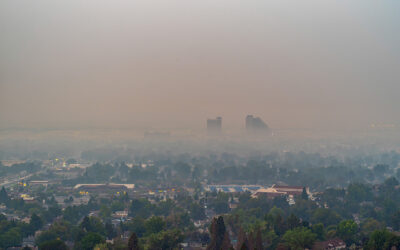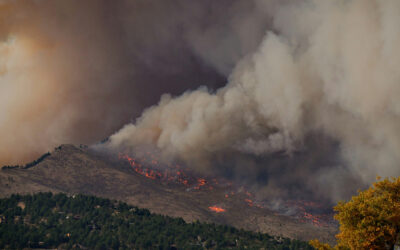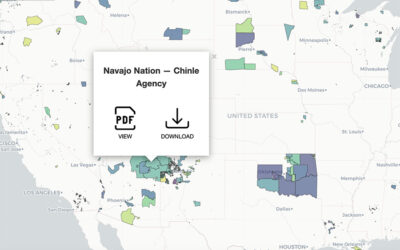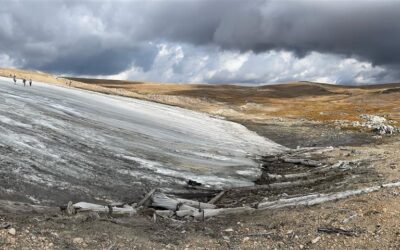The comprehensive research examined air quality in Reno, Nevada during 106 wildfires to illuminate the atmospheric and public health impacts of smoke. The research, published in April’s issue of Environmental Science: Atmospheres, measured air quality in Reno, Nevada over a 19 month period between 2017 and 2020 to capture both smoky and clear days.
New Study Finds Rocky Mountain Snow Contamination
An examination of Rocky Mountain snow finds higher contamination levels of mercury and others metals in the northern part of the range, consistent with increased current and historical mining in the region. The study, published in the May issue of the journal Environmental Pollution, examined contamination levels for Mercury, Zinc, Cadmium and Antimony from nearly 50 sites in the Rocky Mountains.
Blurring the Line Between Rain and Snow: The Limits of Meteorological Classification
A new study published in Nature Communications utilizes insights gleaned from DRI’s Mountain Rain or Snow project to evaluate why traditional weather forecasting struggles to identify the rain/snow transition line. The research was possible because thousands of community members across the U.S. contributed more than 40 thousand observations of the type of precipitation falling at their location.
Weather Whiplash is Amplifying Wildfire Risk
While fires engulfed large swaths of southern California in early January, destroying more than 16,000 structures, taking at least 29 lives, and choking the air with smoke, a new study about weather whiplash was released. Co-authored by DRI’s Christine Albano, the research examined how a warming climate is creating an atmosphere more prone to extreme weather. Now, Albano and her co-authors have released a new report that applies the knowledge gained from January’s study to the recent fires, analyzing the broader climatic context that contributed to the unprecedented infernos.
New Study Traces Indigenous Population Shifts in North America Before Europeans
DRI’s Erick Robinson, Associate Research Professor of Climate and Archaeology, co-authored a new study that provides insight into North America’s Indigenous communities prior to European contact. The research found that although Indigenous populations varied regionally, the continent saw a population peak around 1150 A.D. before experiencing declines, likely stemming from drought, disease, emigration and warfare. A brief recovery around 1500 A.D. was followed by a sharp decrease upon the arrival of Europeans.
Floods, Droughts, Then Fires: Hydroclimate Whiplash is Speeding up Globally
DRI’s Christine Albano co-authored a new study that examines how a warming climate is creating an atmosphere more prone to extreme weather. This “hydroclimate whiplash” is evident in California’s recent weather, with winters filled with repeated atmospheric river storms driving the plant growth that the dry summers then parched, providing plentiful fuel for explosive wildfires.
New Climate Projections Released for Tribal Lands
Earth’s climate future is often discussed in terms of degrees of warming, but for farmers and ranchers, temperature is not the only metric that matters. Other variables such as the number of frost-free days, timing of first snowfall, or changes in spring and summer precipitation are critical to planning future planting, growing, irrigating, and harvesting activities. To help Native agricultural producers prepare for the changes to come, Native Climate has compiled detailed local climate projections for 633 tribally controlled areas in the United States, including Alaska Native Villages and State Designated Tribal Areas, and climate divisions for the State of Hawai‘i.
Ice Patches on Beartooth Plateau Reveal How Ancient Landscape Differed From Today’s
DRI scientists Joe McConnell and Nathan Chellman co-authored a new study that examines a 6,000-year-old forest preserved in a Rocky Mountain ice patch. The research, which was led by the USGS and Montana State University, used the fossil wood to develop tree-ring based temperature estimates of the mid-Holocene period. The study can provide insight into the future elevational movement of forests under climate change, the scientists say.
Reno-Sparks Heat Mapping Project Releases Detailed Urban Heat Data
The summer 2024 data collection effort provides community members, legislators, and scientists with detailed maps of the region’s urban heat island. The campaign took place on August 10th, a clear and hot day for our region. The measurements and maps produced from the campaign reveal a great deal of variability across the nearly 200 square miles of our study area and between the early morning, mid-afternoon, and early evening time periods of the study.
Lead Pollution Likely Caused Widespread IQ Declines in Ancient Rome, New Study Finds
Lead exposure is responsible for a range of human health impacts, with even relatively low levels impacting the cognitive development of children. DRI scientists have previously used atmospheric pollution records preserved in Arctic ice cores to identify periods of lead pollution throughout the Roman Empire, and now new research expands on this finding to identify how this pollution may have affected the European population.









